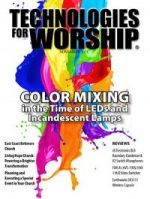Do Your Research
Your worshipers want CDs and DVDs. You want to supply them, but where do you start? With so many options in the CD/DVD duplication and printing market, many worship centers are overwhelmed. What’s the best solution?
Ralph Klein at Noble House in Chatsworth, CA says, “Know your needs.” As a sales and marketing manager in the duplication industry for ten years, Klein has helped many worship centers meet their needs with CD/DVD duplication. “Churches are the latest big explosion in the CD duplication market. There is definitely a demand, but most churches don’t know where to start. I always say the best way to start is ask another church.” We thought that was good advice, so that’s what we did.
Automated Duplicator
“I prayed about what to do,” says Joyce Long, media and marketing coordinator for Mount Pleasant Christian Church in Greenwood, Indiana. “People started asking for CDs and we knew we had to make a change.” That’s when Long’s volunteer media team started researching CD duplicators and printers. “The three-step process of duplicating, printing and sticking was too time consuming,” explains Long. “We wanted a one-step process with a professional look.”
Long’s team chose the Composer Optical Disc Duplicator and Signature IV CD Color Printer from Primera Technology, Inc. Composer integrates a single 48x CD-R drive that records 50 discs per job hands-free. A robotic arm picks up the CD from the start bin, places it in the recorder, shuffles it to the printer and finally drops it off in the finished bin. Composer must be connected to a PC to duplicate and print. The PC holds the data as it is copied from the hard drive. To meet their non-labeling needs, Long’s group chose the Signature IV printer, because no labels were required. Signature IV prints full-color, photographic images directly onto the surface of CDs. Once a job is started, no operator intervention is required.
“This is a great all-in-one system,” says Klein. “It’s not the fastest solution, but if you want to start a job at the end of the workday and have 50 discs recorded and printed in the morning, this is a great machine.”
Automated systems usually offer between 25 and 450-disc capacity. For even faster duplication, automated systems offer four or more CD-R or DVD-R drives. Some systems are sold with a printer, while others are sold separately.
Tower Duplicator
Rocky Mountain Christian Church in Niwot, Colorado already uses a 400-disc duplicator with four drives. Eric Rizner, the director of technical ministries, tells us, “We’ve only had our duplicator and printer for a short time and we’re already producing 500-600 discs a month. Because we charge $3.00 a disc, we’ll pay for our complete system in one year.”
All of the churches we talked with charge parishioners between $3.00 and $6.00 per CD. When the cost per disc starts at about 40 cents, there is even an opportunity for fundraising. “We’re using the duplicator to copy Sunday morning sermons and create practice CDs for our Praise band and choir,” says Rizner. “We realize we can use our duplicator to raise money for youth programs and mission trips in the future.”
As Rizner’s demand grows, he will investigate faster options for copying discs. “We’re really trying to see this on a much grander scale. We will want to add another printer. For our 100% coverage discs, it takes about 90 seconds to print. We want to be faster. We would also like to add a tower for a faster burn and use our duplicator as a printer autoloader. Then, we can pre-print discs and our parishioners can leave with a sermon on a disc. We’ve even thought about DVD in the future!”
CD towers add a higher-volume element to duplication. The tower system has a “master drive” for the original CD and two to 16 drives stacked on top of one another. Speeds vary, but a 48x CD-R drive will copy a full 650-megabyte disc in 3-4 minutes. By choosing a 10-tower duplicator, you can record 9 CD-Rs in 4 minutes or less. Although tower CD copying is faster, you will need to designate a person to continually refill the drives, as robotic arms are rarely available. Printers are not sold with towers as a system. If you want to print, you will need to purchase a printer separately. Klein adds, “A tower is the most simplistic duplicator in the world. If you need discs fast and don’t mind manually feeding the drives, a tower is faster and cheaper. You will have to separate your printing with a printer autoloader or a hand-fed printer.”
As Klein mentioned, you can hand-feed a printer one CD at a time or automate printing by purchasing a printer autoloader. A printer autoloader is an automated system that uses a robotic arm to feed discs into a printer. Printer autoloaders range from 25 to 450 disc capacity. Some duplicators also have a “print only” option. If you already have a duplicator like Rizner, you can copy CDs in a tower for quick recording and print them using your duplicator’s “print only” option.
Printers
“Printers are a big deciding factor,” says Klein. “Most people have moved past sticky labels and want to print directly onto the surface of the disc. That requires a decision between inkjet or thermal printing.” Inkjet printers print full-color, photo-quality images directly onto the surface of printable surface discs. These discs have a white or cream face that absorbs ink from the ink-cartridge. Inkjet printers are not waterproof or scratchproof, but they produce high-quality results. “I’m amazed at how people react when they see a printed disc,” adds Rizner. “They say, ‘Wow! Is that on the disc?’ It gets people really excited!” Some inkjet printers even have adapter kits to print rectangular business card CDs, “hockey-rink” style discs and 80mm mini-discs.
For waterproof discs, many churches choose thermal printing. With thermal printing, ribbons are used to print primarily monochrome or two-color prints directly onto the surface of silver or gold CDs. Some thermal ribbons are paneled for two and three-color printing, while others require you change ribbons for the second and third color. Thermal printers are also much faster than inkjet. They can print a full one-color disc in about 2-10 seconds. Inkjet printers print a full-color disc in 16-90 seconds.
Words of Wisdom
When considering the purchase of a CD duplication and/or printing system, Klein advises worship centers to ask themselves four important questions:
How many discs will you need to copy?
“Deciding volume will help determine the disc-capacity and type of duplication system that fits your needs,” explains Klein.
What is your turn-around time?
“If you need discs right after a service, you’ll need a tower. If you have more time, you can choose an automated duplicator,” adds Klein
Do you want to print discs? If so, do you want to print full-color, complex graphics or simple one- or two-color text?
“For the best quality, full-color text, choose inkjet. If you want simple text and logos, choose thermal,” says Klein.
Have you done your research?
“Once you’ve answered the above three questions, it’s so important to know your options,” explains Klein. “If you do your research, you’ll be in a much better position.”




